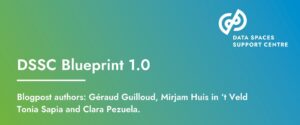This content was created by the Data Sharing Coalition, one of the founding partners of the CoE-DSC.
The Data Sharing Coalition supports organisations with realising use cases at scale to exploit value potential from data sharing and helps organisations to create required trust mechanisms to share data trusted and secure. In our blog section ‘Q&A with’, you learn more about our participants, their thoughts, vision, and ideas about data sharing. Edo de Vries Robbé, Co-founder and Chief Commercial Officer at Knights Analytics, shares his thoughts.
1. Could you introduce your organisation?
Knights Analytics is a deep tech, AI company focused on automating the manual parts of preparing and extracting value from data. Our software enables you to cross-reference multiple data sources to automatically collect the insights on the most important entities or concepts within the data. Our customers decide which data they want to match, whether that’s been sourced internally or externally. Our next generation entity resolution technology allows us to clean, connect, and enrich this data. If you have challenges matching entities or concepts across your data – we are the solution.
Our projects almost always include large datasets from various structured and unstructured sources such as customer data, news data, documents, or public databases. We have deep expertise in financial crime detection, but our software has been used across many verticals and use cases including healthcare, investments, and advertisement. For example, we can help customers de-duplicate companies across their lending portfolio and enrich their profiles with ESG relevant context, which we are able to extract from open-source data.
We joined the Data Sharing Coalition because we believe that, for data sharing to be more broadly accepted and successful, it is important to work together.
2. To what extent is your organisation involved in data sharing (within and across sectors)?
By design, the Knights Analytics solution has been developed for cross-organisational and cross-domain data sharing. Our customers always look to combine data available from multiple internal and external sources, aggregating the most important information on otherwise hard to match entities and concepts. For example, in the pharmaceutical sector we have clients who were able to match data on a specific disease area across news data, research papers, and clinical trials to inform them about relevant research trials, medicine approvals, and key influencers in their specific area of expertise.
3. Why is or should sharing data be important for your industry or domain?
The purpose of the Knights Analytics solution is to ensure our customers get more value from the data assets they have access to and to help them relate their internal data to relevant external information. We can extract contextual information from public sources to build richer profiles on entities of interest. As an example, by leveraging data from a company’s website, news articles, and Google Maps, we can build a much richer picture of a company’s true nature of business than we would be able to if we just used their registered industry code.
At Knights Analytics we focus on two ways of creating value; increase the quality of the data, while decreasing the time it takes to extract insights from data. We turn data swamps into high value datasets which can be shared and searched, and improve the ability of other organisations to connect with and make use of this same data, allowing for much easier and better quality data sharing.
4. What are the most promising data sharing developments and trends you see in your sector?
Overall, we see a trend towards adoption of best in breed technologies services to help tackle the most challenging parts of extracting value from data.
Natural Language Processing (NLP) and AI
One of the hardest parts about sharing data is having a common understanding of what is what within your datasets. For example, if one of your customers has a common name such as ABC Company, it might already be hard to assess whether it is the same company as an ABC Company in a different dataset.
If you’re lucky you can use their registered address or registration number to help match them, but if you want to leverage news data this method will not work as news articles rarely include business registration numbers or addresses. This is where the Knights Analytics solution comes in. We use softer contextual information to make the connections, replicating how a human analyst would deduce two companies are the same.
Traditionally, it has been down to people to manually work through lots of different databases using search engines to help them find what they’re looking for and then manually collect that data into a report. New technologies and advances in AI allow for translation, extraction of insights from text and matching of concepts across data.
The Knights Analytics solution leverages AI to solve these data challenges at scale. Our powerful engine helps with the heavy lifting involved when analysing data and prevents analysis from becoming outdated as new data arrives. This enables human analysts to be better informed so they can focus on extracting intelligence and interpreting what the data is saying.
Privacy technologies
In addition, significant advances in privacy preserving technologies are now allowing analytics across privacy boundaries, which was previously prohibited. For example, Knights Analytics and Roseman Labs (also a participant of the Data Sharing Coalition) are collaborating on combining state of the art entity resolution with secure Multi-Party Computation (MPC) to ensure we can achieve high quality matching while preserving the highest levels of privacy.
5. How do you see the future of data sharing, and what steps are you currently taking in that direction?
The amount of data available to us is continuing to expand exponentially. Therefore, it has become increasingly hard to make sense of all this data. This is already a problematic challenge for organisations who have a lot of internal data, but it almost becomes an unmountable task when you think about cross-organisational data sharing. How do we connect one organisation’s data swamp with someone else’s, in a privacy preserving way?
With our solution, we help organisations make sense of all the data around them, whether internal or external. This accelerates and enables data sharing in a couple of ways:
- Enhancing the quality of the data inside organisations by turning it into more structured, reusable, and searchable data assets. Thus, we improve the ability for the data to be shared with and be used by other organisations.
- Facilitating the integration of data across data silos by defining a common understanding of key entities and data concepts, and when or how to match them when there is no unique identifying code or ID.
- Matching unstructured data in a privacy preserving way using our entity resolution approaches (the process of working out whether multiple records are referencing the same real-world thing). We are working on this in our ongoing research with Roseman Labs. Together, we have developed a unique capability which is currently not offered by anyone else in the market.
6. Why are you participating in the Data Sharing Coalition?
Knights Analytics joined the Data Sharing Coalition because we believe that, for data sharing to be more broadly accepted and successful, it is important to work together in the public and private domain, with science, the business community, and technology companies. Within the Data Sharing Coalition, we work with like-minded people who are all focused on solving real world data challenges, whether in healthcare, logistics, commerce or financial services.




